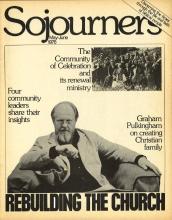“The Holy is that which preserves the belief in the reality of an alternative that is true and trustworthy.” So stated Peter Brown, a noted Oxford historian of the 4th and 5th centuries, one recent evening in Washington when a group of scholars, theologians, and government officials were called together to discuss “Is the Holy Wholly Gone?”
That is a question urgently worth asking in an age ruled by the gods of technology and the nation-state, sustained by faith in progress and ideology.
Throughout history those whose lives have been grasped by God have sought to worship and cling to a sense of sacred holiness amidst a world, and often an institutionalized church, which appeared dominated by the profane.
In the 4th and 5th century, when traditional foundations of society seemed to be crumbling, a few individuals sought God by severing the normal ties of kindred and society, embarking for the solitude of the desert. These ascetics and hermits became known as the “holy men.” To the society they were seen as bearers of the eternal, those whose lives were testimonies to the truth that God’s life was still present in the world. Particularly in the unstable and increasingly rootless culture of Egypt and Syria, these holy ones eventually came to play a central social and political role through the purity of their quest for God.
Read the Full Article

